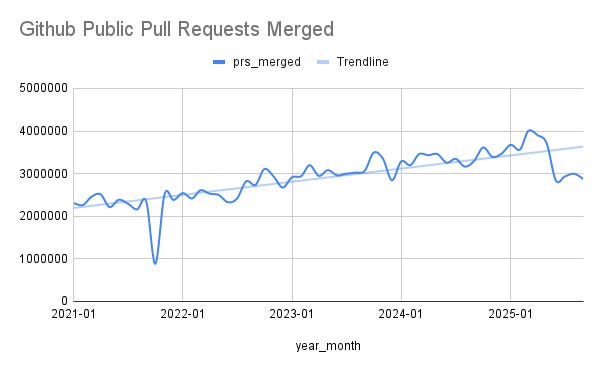It’s been an interesting month. My essay arguing “if AI coding makes everyone so productive, where is all the shovelware?” went viral. After doing a journalist interview and with more coming up, here are the questions I wish I were asked:
“You got pushback that coding speed doesn’t equal shipping speed. How do you respond?”
Look, I get that there are bottlenecks beyond coding like meetings, decisions, and design work. But if developers were truly 10x more productive at coding, and companies weren’t harnessing that to ship more software, those companies would be fucking fools.
If someone handed me a tool that made my coding team 10x faster, I wouldn’t lay people off to maintain the same output. I’d get the CEO on board, hire 10x more developers, and suddenly have a 100x coding team. We’d outcompete everyone on features, integrations, experiments, just more software across the board.
The fact that we’re not seeing this gold rush behavior tells you everything. Either the productivity gains aren’t real, or every tech executive in Silicon Valley has suddenly forgotten how capitalism works.
“What is AI coding actually good at?”
Github Copilot literally has a Best Practices page listing what it does best at the top:
Writing tests and repetitive code
Debugging and correcting syntax
Explaining and commenting code
Generating regular expressions
I’ll add that it legitimately helps developers get over staring at a blank screen, especially when learning unfamiliar frameworks or generating DSL code like SQL. But that’s still a far cry from the revolutionary productivity gains being promised. These are useful but random improvements, not industry-transforming multipliers.
“What about all these companies claiming X% productivity improvements?”
I think they’re either relying on subjective developer surveys (which measure how people feel about productivity rather than actual output) or they’re lying because “AI makes us super productive” is attractive to investors.
As someone skeptical of these claims, I’d love to see actual charts, methodology, or honest discussion of where it fell down as well as succeeded for their companies.
“If AI coding isn’t making developers more productive overall, why does it feel helpful?”
The first impression is amazing. You see code flying by and think “wow, it would have taken me two afternoons to write those three pages.” Then you look closer and realize half of it sucks or is wrong, but you iterate and iterate. For whatever psychological reason, you’re not counting all the time spent getting it into a shape worth committing.
It’s intermittent reinforcement (like gambling.) Occasionally it nails the prompt first try, which is genuinely impressive, mixed with many misses. You remember the jackpots and forget the hours of pumping in tokens.
“Why did you publish this? If they like it, just let them like it.”
Because it felt like the biggest scam ever perpetrated on me.
Three months ago, I was a Principal Engineer with 25 years of experience, studying linear algebra at lunch breaks, convinced I needed to retrain as a machine learning engineer before AI took my job. On some level, I was excited about finally being able to crank out all those consumer app ideas I’d been sitting on, if I could just figure out the magic incantation to make these tools work. But the fear was everywhere:
Daily posts on /r/ExperiencedDevs about people fired or threatened for not adopting AI tools
TikTok demos of people having multiple agents writing code at the same time
Old coworkers were freaked out, warning their kids away from computer science
Developers I knew personally kept reporting productivity breakthroughs I couldn’t replicate
I thought I was failing at something everyone else had figured out.
Then I discovered that not only did I suck at this, everyone else did too. Nobody was moving the needle. There wasn’t any shovelware explosion or indie revolution. No company was drowning competitors in AI-generated software1.
It’s all bullshit, and then I got pissed.
These companies that are making AI coding tools know their products don’t actually help people ship more software. GitHub owns both the dominant AI coding assistant (Copilot)2 and the platform where most of the world’s software development happens. They have exclusive visibility into whether developers using their AI tools are actually producing and shipping more code. The data clearly shows they aren’t, and GitHub has to know it.

There’s no AI coding bump. Yet they’re claiming on their front page, “Delegate Like a Boss.” Meanwhile, I’m studying linear algebra at lunch thinking my 25-year career is over. Fuck them.
If you’re coming to this late, you can see that whole journey with charts over at the original essay from earlier this month.
GitHub Copilot has over 20 million all-time users as of mid-2025, including free, paid, and student licenses. Microsoft reported that 90% of the Fortune 100 companies use GitHub Copilot. Both from TechCrunch.

It’s extremely helpful to have hard-nosed people looking at the evidence on the ground here, when there are so many incentives (by companies, investors, etc.) to push a pro-AI story.
Also, linear algebra is a cool subject. Something doesn’t have to be useful to your career to be worthy of study. Besides, what else are you going to do during your lunch break?
I’m studying linear algebra at lunch too but for quantum reasons, curious if you’re also using Gil Strang’s book? If not check him out he is a treasure.